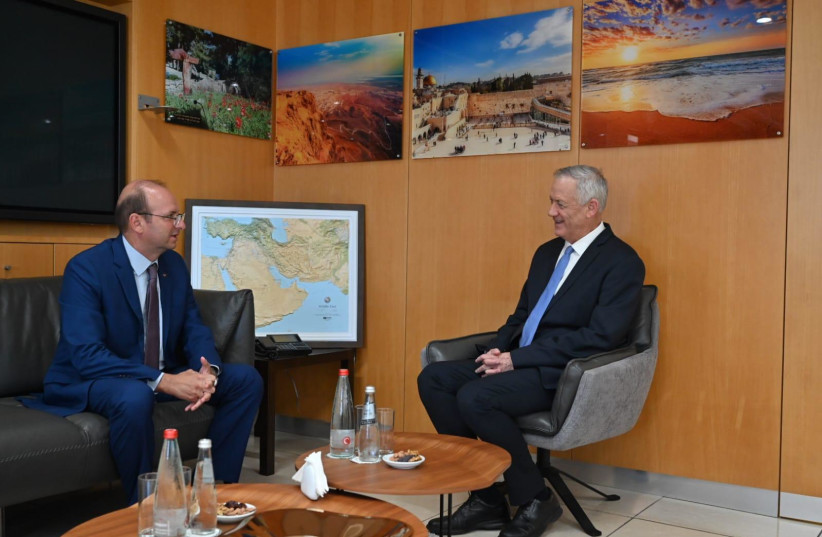Iran gives millions of dollars annually to Palestinian Islamic Jihad so that it can attack Israel, Defense Minister Benny Gantz said Thursday as the dispute over the release of Palestinian prisoners threatened to undo the fragile Gaza ceasefire.
“Islamic Jihad has an open tab in Iran,” he said, adding: “Iran provides Islamic Jihad in Gaza with tens of millions of dollars per year.”
“Iran, via the Islamic Revolutionary Guard Corps, transfers know-how and attempts to smuggle materials to Gaza, which are then used to build weapons aimed at civilians,” Gantz said.
He spoke during a joint press conference with his Cypriot counterpart, Charalambos Petrides, who visited Israel less than a week after the end of Operation Breaking Dawn in the Gaza Strip, in which the IDF attacked Islamic Jihad targets.
The terrorist group launched 1,100 rockets at Israel, including about 200 that never reached their target but landed instead in Gaza.

Visiting al-Saadi
An Egyptian-brokered ceasefire late Sunday night put an end to the hostilities that began last Friday when the IDF killed Islamic Jihad commander Tayseer al-Jaabari. Tensions had already been high since the IDF detained West Bank Jihad leader Bassem al-Saadi last Tuesday.
A UN team visited Saadi’s family in Jenin last week and visited him in prison on Wednesday.
“Today, I dispatched a #UN team to visit Saadi to follow up on UN commitments to maintain calm in #Gaza,” UN Special Coordinator for the Middle East Peace Process Tor Wennesland tweeted late Wednesday night. “I reiterate that the ceasefire in Gaza is very fragile and I call on all sides to preserve the calm.”
Islamic Jihad has insisted that Israel promised to release Saadi and administrative detainee Khalil Awawda, who has been on a prolonged hunger strike and has been hospitalized due to his deteriorating condition.
Fighting with Israel will resume, the Islamists warned, if the two men are not released.
No such pledge had been made to release prisoners connected to Palestinian Islamic Jihad, Gantz told Channel 12 on Tuesday.
Israel has broadcast a persistent message to the international community about Iran’s involvement in the weekend violence.
“While the world watched ‘another escalation between Israel and Gaza,’ I stopped to emphasize [that] the Iranian ayatollahs are involved in this front,” Gantz said during his press conference on Thursday with Petrides.
“Islamic Jihad in Gaza is a violent Iranian proxy,” he said. “Their leadership visits Iran and meets Iranian leaders frequently.”
Israel must remain vigilant and will “maintain its freedom of action in all arenas,” Gantz said. “Our eyes and targets focus on anyone who threatens the security of our citizens – from Khan Yunis to Tehran.”
“On the strategic level, Israel will continue to work with our partners in facing Iranian aggression, which harms security and stability everywhere – from the Israel-Gaza border to the Mediterranean Sea, to the Gulf and beyond,” he said.
Israel-Islamic Jihad's three-day military operation
Debate continued to swirl Thursday about the 47 Palestinian fatalities during Operation Breaking Dawn, which included 15 children aged 16 and under.
UN High Commissioner for Human Rights Michelle Bachelet said she was alarmed by the high number of fatalities, particularly among the children.
“A number of Israeli strikes hit prima facie civilian objects, causing civilian casualties and damage to civilian objects,” her office said.
Israel has said at least 21 of the Palestinian fatalities were Jihad-affiliated operatives and that many of the civilian casualties were caused by Palestinian rockets that fell short of their targets.
“Their disregard for human life was tragic, as multiple failed rocket launches led to the deaths of innocent Palestinian children in Gaza,” Gantz said.
Israel’s Iron Dome air-defense system intercepted rockets that threatened populated areas, preventing any Israeli fatalities. Some 70 Israelis were wounded, however, according to UN figures.
"Islamic Jihad in Gaza is a violent Iranian proxy. Their leadership visits Iran and meets Iranian leaders frequently."
Defense Minister Benny Gantz
At a UN Security Council debate Monday on the Gaza flare-up, Wennesland said its roots were in the escalating West Bank violence that has included Palestinian terrorist attacks against Israelis and IDF operations against Palestinian militants.
He cited past Israel-Gaza conflicts, including the 11-day war between the IDF and Hamas 15 months ago. Hamas did not join last weekend’s fighting.
“These cycles of violence will only cease when we achieve a political resolution of the conflict” that allows for a two-state solution based on the pre-1967 lines, Wennesland said. “I reiterate my call to the Israeli and Palestinian leadership, along with the international community, to strengthen diplomatic efforts to return to meaningful negotiations toward a viable two-state solution.”
